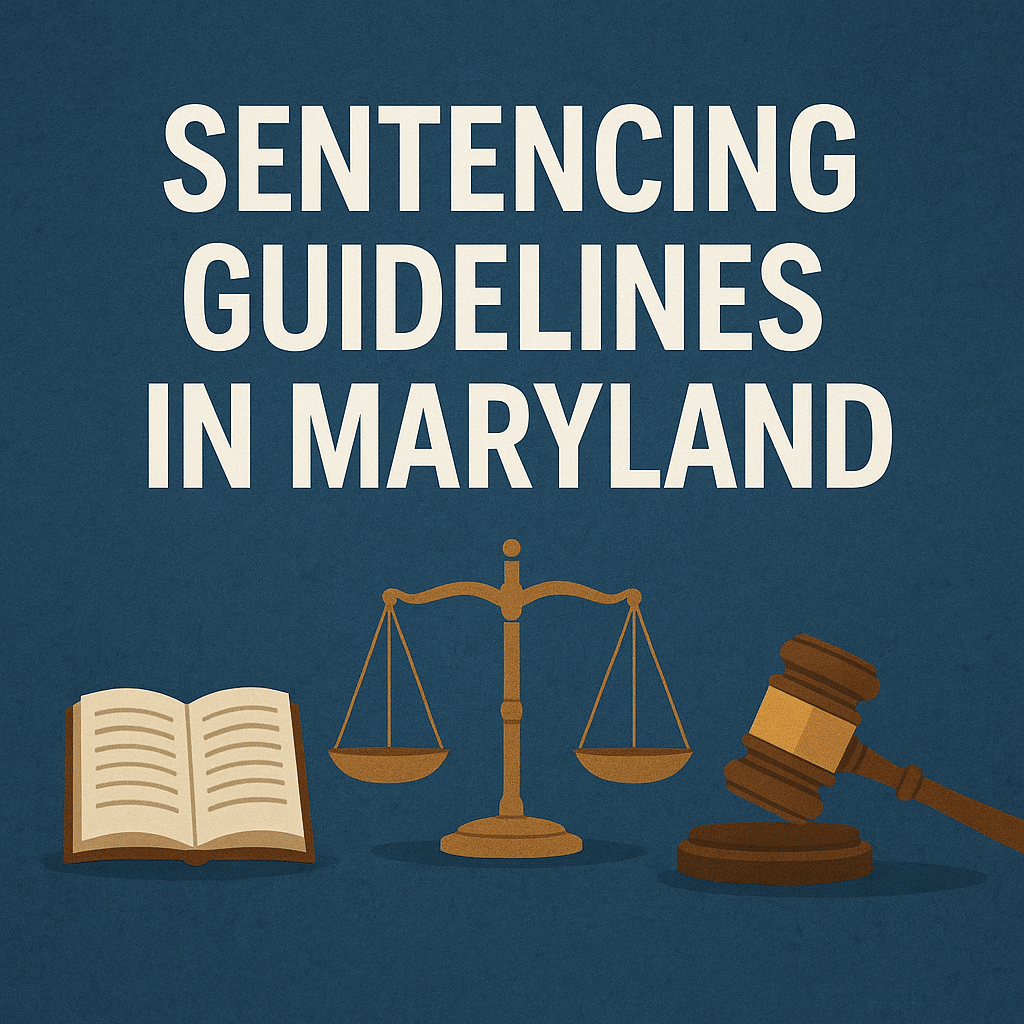
If you’re facing criminal charges in Maryland, one of the most important questions you may have is: What kind of sentence am I looking at if I’m convicted? Maryland uses a set of sentencing guidelines designed to bring consistency and fairness to criminal sentencing. But these guidelines are complex, and the final outcome can depend heavily on how they’re interpreted and applied in court.
In this post, we’ll break down how sentencing guidelines in Maryland work, who creates them, how they affect your case, and why having a knowledgeable criminal defense lawyer can make a significant difference.
What Are Sentencing Guidelines in Maryland?
Sentencing guidelines are advisory frameworks used by judges to determine appropriate punishments for criminal convictions. In Maryland, these guidelines are developed and maintained by the Maryland State Commission on Criminal Sentencing Policy (MSCCSP).
The guidelines consider several key factors:
- Offense seriousness category (ranging from I for the most serious crimes like first-degree murder to VII for less serious misdemeanors)
- Defendant’s criminal history or offender score
- Whether the offense is drug-related, violent, or property-based
These factors are combined to produce a recommended sentencing range, expressed in months or years. For example, a non-violent first-time offender might receive a much lighter recommendation than a repeat offender convicted of a similar charge.
Are Maryland Sentencing Guidelines Mandatory?
No. Maryland’s sentencing guidelines are voluntary, meaning judges are not legally bound to follow them. However, judges are required to consider the guidelines and must document any deviations from them in writing.
That means if your sentence falls outside the recommended range, the court must explain why. These deviations can sometimes be challenged on appeal, depending on the circumstances.
How Sentencing Guidelines Impact Your Case
The guidelines are often used during plea negotiations and sentencing hearings. Prosecutors, judges, and defense attorneys rely on them to:
- Estimate likely outcomes
- Argue for lighter or harsher penalties
- Evaluate whether a plea deal is reasonable
For example, if the guidelines suggest a sentence of 3 to 6 years, a plea offer of 2 years with probation may be seen as favorable.
But here’s the catch: the way your case is scored can drastically change the range. Certain aggravating or mitigating factors—like use of a weapon, cooperation with authorities, or completion of treatment programs—can influence where you fall within the guidelines.
What Crimes Have Sentencing Guidelines?
Maryland sentencing guidelines apply to most felonies and some serious misdemeanors, including:
- Assault
- Theft over $1,500
- Drug distribution
- Burglary
- Weapons offenses
Minor misdemeanors such as disorderly conduct or DUI typically fall outside the guidelines and are governed by statutory penalties.
How Do Judges Use the Guidelines?
Judges typically receive a sentencing worksheet at the time of trial or plea. This document summarizes the crime, the defendant’s record, and other relevant information.
After reviewing the worksheet and hearing arguments from both sides, the judge will decide whether to sentence within the guideline range, go below, or above it. For instance, a judge might sentence below the guidelines if the defendant is a first-time offender and shows genuine remorse.
Why You Need a Criminal Defense Lawyer Who Understands the Guidelines
Understanding sentencing guidelines in Maryland requires more than a quick Google search. It involves knowing how each judge interprets them, understanding local practices in jurisdictions like Charles, Calvert, St. Mary’s, and Prince George’s Counties, and identifying legal arguments that justify a downward departure.
At Southern Maryland Criminal Defense, we analyze the sentencing guidelines in every case and use them to your advantage—whether we’re negotiating with the prosecutor or advocating for a lighter sentence in court.
Get Help with Maryland Sentencing Today
If you’re under investigation or already facing charges, don’t leave your future to chance. Call us for a consultation and let’s talk about what the guidelines say—and how we can fight for the best possible result in your case.
Contact Southern Maryland Criminal Defense today to speak with an experienced attorney who knows how to navigate Maryland’s sentencing guidelines and protect your rights.
